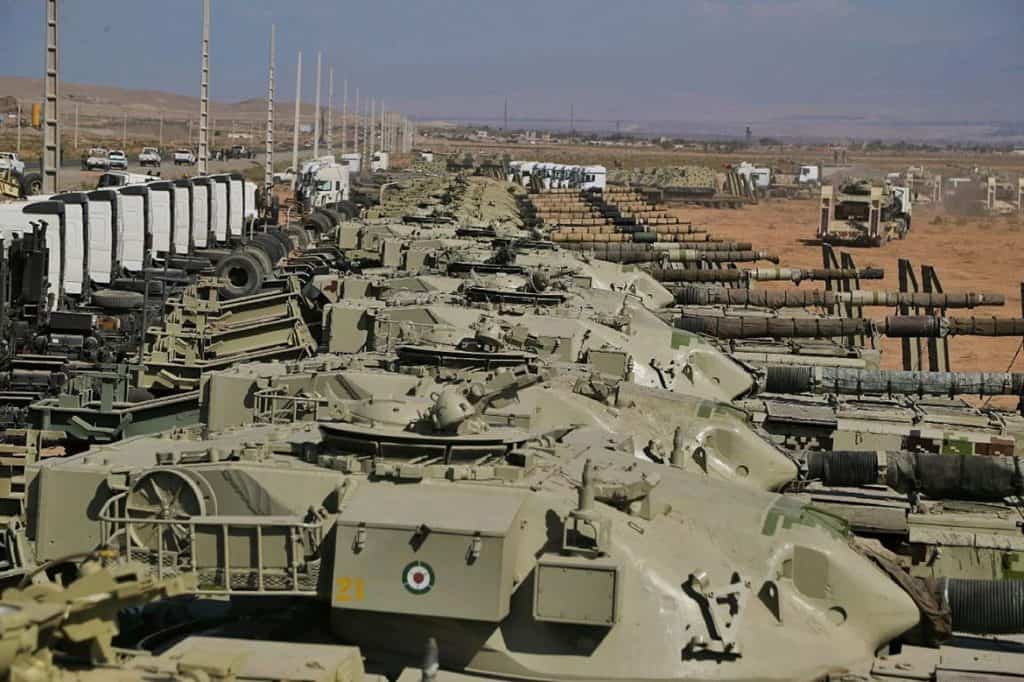David Davidian
The Azerbaijani attack on the Nagorno-Karabakh Armenians just over a year ago might have been the prelude to the standoff we are witnessing today between Azerbaijani irredentism and an Iranian military buildup on the Azerbaijani-Iranian border.

The level of rhetoric is significant, including Iranian officials claiming “third party” influence in Azerbaijan aimed against Iran. These officials point to Israel as the third party. Statements have been direct, such as “Zionist entities” on Iran’s borders, while supporting Armenia’s internationally recognized borders.
Most issues between Baku and Tehran are handled diplomatically, such as Azerbaijani soldiers harassing Iranian truck drivers as they drive north into Armenia using disputed highways. In contrast, there appears to be pressure building on Iran in the form of a so-called “Brotherhood” between Turkey, Azerbaijan, and Pakistan. This fraternal union is nothing new since the Turkish military generally ran Azerbaijan’s war against Nagorno-Karabakh’s Armenians; Pakistani soldiers were involved in the fighting, as were Jihadist fighters imported by Turkey from Syria and Libya via Georgian airspace into Azerbaijan. Turkey and Azerbaijan have held several military maneuvers in the region in the past six months, flexing their newly joined muscles. Still, none of them caused an Iranian military buildup on Azerbaijani’s borders. Such deployment is financially expensive. What has changed? Even though Azerbaijani President Aliev claims all of southern Armenia as Azerbaijan and Iran claims Israel uses Azerbaijan as a base for anti-Iranian operations, most consider Aliev’s posturing invective because southern Armenia is an internationally recognized part of Armenia. And it’s no secret Israel has intelligence bases in Azerbaijan. Is Aliev’s rhetoric for domestic purposes and Iran’s military drills just posturing?
Perhaps what is new is the construction of a state-of-the-art international airport in the small town of Fizuli, captured from Armenians last year, about thirty kilometers from the Iranian border just inside Azerbaijan. The question is why Fizuli and the rush to build a functioning airport in less than a year in an unpopulated and rather barren area? One answer could be to populate the area and invigorate local commerce. However, there may be other reasons.
It is interesting that in articles authored by those with a recurrent penchant for taking simultaneous extreme pro-Azerbaijani/anti-Armenian positions, have recently published articles lauding the construction of the Fizuli International Airport. Some of these authors have visited the site. The countries involved in Azerbaijan’s development of conquered territory include Turkey, China, Israel, Italy, and others.
Not having an intelligence service on demand requires one to rely on publicly available data and some reasoning. If Fizuli airport and regional construction were not in open source highlights, any covert role might have gone unnoticed. For sure, it would not have gone past the eyes of intelligence services, including those of Iran. In about nine months, an airport project went from conception to completion. The Fizuli airport has a three-kilometer runway, long enough for heavy transport and modern fighter jets. Given the relationship between Azerbaijan and Israel described by Aliev as “like an iceberg, nine-tenths of it is below the surface,” and the nature of the Israeli-Iran enmity, Israel would be grossly remiss if it were not to complement its monitoring of Iran and enhance covert activity targeting Iran from these conquered lands.
Further, both Iran and Israel tend to fight each other through proxies and covert actions. Perhaps Fizuli will serve as a NATO-friendly hub on the Iranian border. Between the Second Karabakh War began and today, just over a year, what used to be a “don’t ask, don’t tell” Azerbaijani threat to Iran has taken a more critical dimension. Iran has reacted, as would most sovereign states.
The political rhetoric has increased to a level where on October 4, there were calls (click “Translate Tweet”) from within Iran – a trial balloon perhaps — for a military agreement between Iran and Armenia to protect southern Armenia from attack and occupation by Turkish and Azerbaijani forces. Reporters in Iran generally don’t make such statements offhandedly but parallel’s official Iran’s warning published in Persian, Arabic, English, and Hebrew on October 2, warning of “foreign influence in Azerbaijan.
Whatever changed in the past month, Iran had deemed it of military significance.
Author: David Davidian (Lecturer at the American University of Armenia. He has spent over a decade in technical intelligence analysis at major high technology firms. He resides in Yerevan, Armenia).
(The views expressed in this article belong only to the author and do not necessarily reflect the editorial policy or views of World Geostrategic Insights).
Image Source: Iranian Army








